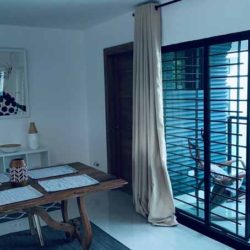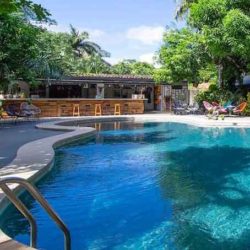
As much as we love writing our own Costa Rica stories, we are only there part-time, and have only recently spent a full month. To get more diversity and insight, we have been on the hunt for ex-pats to interview.
First up is Jim Reilly, a lawyer (and the lawyer on all of our real estate matters) who moved to Tamarindo in 2003:
I often work from home (in board shorts), and I eat dinner with my family nearly every night. I really enjoy those aspects of my life compared to my legal practice in California, Tokyo or London. The sun rises about 5:30AM and sets around 6:00PM year round. That translates into early mornings and not too late evenings with lots of time for family and friends.
— Jim Reilly
What is your background pre-Costa Rica? Where did you grow up? If law wasn’t your first career, what did you do?
I was born and raised in Stamford, CT, joined the U.S. Marines at 17 and was honorably discharged at 21. I graduated from U.C. Irvine with a major in English literature and a minor in German literature. I spent a year abroad in Goetting, Germany. I then graduated from Cornell Law School. After law school I became a member of the California Bar and practiced with the California firm Morrison & Foerster LLP in Orange County, California and Tokyo, Japan. My practice area was International Project Finance. In 2000 I left MoFo (as it is affectionately known) and took a position with Courder Brothers LLP in London, England.
When did you move to CR? Did you always want to live abroad – what was the motivating factor?
I moved to Costa Rica in 2003. I had lived in Tokyo and London (as well as my year abroad in Germany) before moving to Costa Rica. I have always been attracted to the ex-pat lifestyle. As an English major, I enjoyed the novels of Henry James and their narrative of the American abroad.
I met my family here on a vacation in 2003 and at the time I had already planned on leaving London for somewhere. I was only planning on staying in Costa Rica till I figured out my next move. In fact, I got a job offer to go back to London which I initially accepted but my gut told me if I went back, I would be a corporate lawyer for the rest of my life. I called the firm back and told them I changed my mind. I knew at that moment the die was cast, and I would never go back to corporate life.
Tamarindo has been my home ever since.
Why CR? Did you consider other places? How long did you plan your move?
I really just came on a holiday. I did consider other countries, including Nicaragua, Colombia, Venezuela and Argentina. Ultimately, Costa Rica made the most sense. The people, the beauty of the country, the proximity to the US and the potential for growth made it a pretty easy decision.
What were the early days after your move like? How long until you felt feel like CR was home? What tips do you have for people looking to make a new home here?
Oh boy, what a roller coaster. I moved here from London. I went from a city of twelve million people to a beach town where a phone and a car were considered luxuries. Surfing in board shorts and living at the beach was fantastic.
On the other hand, I remember getting stuck on a back road in the rain with no phone and no one to call even if I had one. I felt pretty alone at that moment. Eventually some locals passed by, tried to free my car and eventually gave me a ride home. I recall thinking: wow, this is a pretty cool place.
Costa Rica will begin to feel like home once you integrate with the community. It’s relationships that make it feel like home. These days, I think a move to Costa Rica is relatively easy. We now have reliable Internet, mostly paved roads, well stocked supermarkets, international schools and most of the restaurants stay open in October. My favorite tip is to accept Costa Rica for what it is and do not try to make it into or compare it to where you are from. Once you do that, the beauty and the magic of the land and the people will open to you.
What is your life like in CR? What is a typical day? What does your career look like now?
Oh man, do I feel blessed. I spend most of my time focused on my legal practice. I consult with my wife, Susanne, on our HOA management business and with Katie Meyers, the head of our real estate firm, on legal and strategic aspects of those businesses.
I often work from home (in board shorts), and I eat dinner with my family nearly every night. I really enjoy those aspects of my life compared to my legal practice in California, Tokyo or London. The sun rises about 5:30AM an sets around 6:00PM year round. That translates into early mornings and not too late evenings with lots of time for family and friends.
Did you meet your wife in CR? If so, what’s the dating scene like?
It is incredibly easy to meet people here. If there is a challenge, it is the transient nature of a tourist town. That applies to friendships as well as relationships. People come and go. As the area continues to grow, there seems to be a larger base of full timers. Even if it turns out to not be forever, I think most people really enjoy their time here.
Susanne and I met in Tamarindo in 2005. We started off horribly but she quickly learned the error of her judgment. It was also a much smaller town in those days so her choices were limited!
Do you have children? How old? What is it like raising kids in CR? Tips for parents?
Susanne and I have one son – Damien. He is 9 years old. Tamarindo is a great place to raise children. We are very connected with nature. We spend our free time in the ocean, mountain biking, playing soccer or rock climbing. As for tips, kids seem to be better at adapting to a new culture than their parents. Your kids and dogs are going to be fine. It is you that is going to have to adapt.
For people thinking about moving to CR, what advice would you give about how to make the move – e.g., specific steps to take, how long you should expect to plan, how much money you should save up to get started, etc.
Logistically, you can get on a plane and rent a home in a matter of days. Most people prefer to do some research. I recommend visiting the area where you plan to live. Visit potential neighborhoods. If you have children, visit the schools and ask to speak to other parents. Ask open ended questions like: “what should I know about this neighborhood, school, business, etc.” Seek out a professional whom you trust to help you with your move. A knowledgeable and experienced realtor and attorney can make recommendations for most necessities.
Since you’re a business owner, any tips specific to entrepreneurs?
As with the previous question, seek out professional help. Labor law is very different than in the U.S. Commercial law also has some peculiarities the newcomer might not expect. For example, all leases in Costa Rica must have a term of at least three years. I suggest one read as much as he/she can. It is worthwhile to pass your business plan by someone who has experience running businesses in Costa Rica. Even if you have to pay them for their comments, it will be money well spent.
Since you work with real estate transactions, what do you recommend for people looking at buying in CR? What steps should they take?
Do your research. If you are considering a condominium, speak to the HOA president. Ask if there are any issues with the complex. Speak to other owners or tenants in the building. If possible, seek a unit in a complex with more units. Splitting the costs among more owners helps the bottom line. If you are purchasing a home or land to build, confirm you have a legal water source. The seller should provide a contract number or water letter from a water authority. If the property has a well, the well should be inscribed. Your lawyer can confirm the documentation.
What is the most enjoyable part of life in CR? What is the most challenging? What do you miss, if anything, from the US?
Wow, tough question as I am grateful to live here and really enjoy a lot of aspects of Tico culture. I enjoy the freedom and small town feel of Tamarindo. At the same time, Tamarindo is a tourist town that attracts people from all over the world. It is very diverse for a town of its size. The weather and beaches are amazing. I haven’t received a piece of junk mail in the last 16 years and unsolicited phone calls are few and far between. I have not lived in the U.S. since 1999 and the U.S. can actually feel a bit foreign when I visit now. Obviously, the convenience of everything in the U.S. is great, but is also comes at a price.
For people who need legal services in Tamarindo, what does your firm specialize in, and how can people best get in touch with you?
GHP is a full-service law firm and handles a broad spectrum of work. Our primary focus is real estate, private equity transactions and trusts and estates, but we also have litigators and other specialists. Family law is the only legal area where wo do not practice. I am best reached by email at [email protected].
======
Jim’s story of coming here on vacation and deciding to stay really resonates as we bought a place within the first year that we visited. Like Jim, we wanted the ex-pat lifestyle (at least part-time) and weren’t only considering Costa Rica, but it won us over too.
Are you an ex-pat to Costa Rica or do you know someone who would make a good profile? Please email us, and you may be our next interview!


 We are Scott and Caroline, 50-somethings who spent the first 20+ years of our adult lives in New York City, working traditional careers and raising 2 kids. We left full-time work in our mid-40’s for location-independent, part-time consulting projects and real estate investing, in order to create a more flexible and travel-centric lifestyle.
We are Scott and Caroline, 50-somethings who spent the first 20+ years of our adult lives in New York City, working traditional careers and raising 2 kids. We left full-time work in our mid-40’s for location-independent, part-time consulting projects and real estate investing, in order to create a more flexible and travel-centric lifestyle.  Financial independence and early retirement is not something we originally focused on, but over time realized it was possible. Our free report,
Financial independence and early retirement is not something we originally focused on, but over time realized it was possible. Our free report, 





